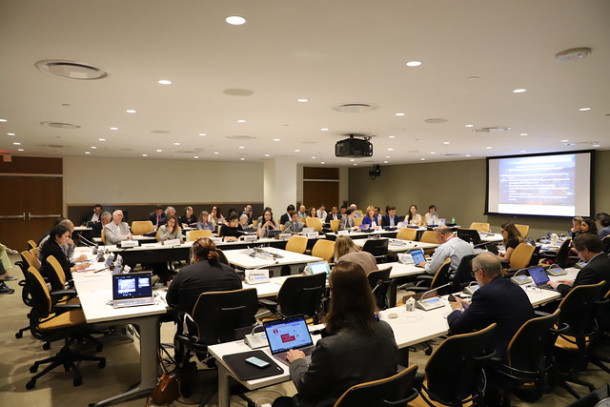
Making the SDGs real: a mission for local and regional governments
Multiple stakeholders embrace localization at UN’s High Level Political Forum on Sustainable Development
Between the 9th and the 18th of July, the United Nations (UN) convened the seventh edition of the High Level Political Forum on Sustainable Development (HLPF), to review progress towards the accomplishment of the 2030 Agenda for Sustainable Development. For the delegation of the Global Taskforce of Local and Regional Governments that attended conferences taking place at the UN headquarters from 15 to 17 July, this HLPF was the occasion to reaffirm that local governance and territorial cohesion must be embraced to leave no one and no place behind.
The HLPF is the official UN platform for the annual follow-up and review of the 2030 Agenda, and is therefore a vital space for local and regional governments to underline the role of strong local leadership and commitment in the achievement of the SDGs. The theme of the 2019 event was "Empowering people and ensuring inclusiveness and equality", and focused on the reviews of the following SDGs:
4. Ensure inclusive and equitable quality education and promote lifelong learning opportunities for all
8. Promote sustained, inclusive and sustainable economic growth, full and productive employment and decent work for all
10. Reduce inequality within and among countries
13. Take urgent action to combat climate change and its impacts
16. Promote peaceful and inclusive societies for sustainable development, provide access to justice for all and build effective, accountable and inclusive institutions at all levels
17. Strengthen the means of implementation and revitalize the global partnership for sustainable development
While 47 national states presented their Voluntary National Reviews (VNRs) about the status of implementation of the aforementioned goals, the Global Taskforce members actively participated in the multi-stakeholder conferences of Local 2030, the network and platform that supports the on-the-ground delivery of the SDGs, with a focus on those furthest behind. Bringing together local and regional governments and their associations, national governments, businesses, community-based organizations and other local actors, and the United Nations system, the different Local 2030 sessions were dedicated to thorough discussions about how such diverse institutions are working on productive partnerships that allow measurable progress on each of the six SDGs reviewed this year.
For the Metropolis Secretary General, these multisector collaborations are the key for the 2030 Agenda to be implemented: “We should work on collaborative governance that connects not only various levels of government, but also with the civil society and the private sector. Disruptive and complex, metropolitan spaces have it all to boost such collaborations”, he stated during the Local and Regional Governments’ Day at the HLPF 2019, organized by the ULCG World Secretariat on July 15.
This event was the occasion to release the third and latest report to the HLPF from the Global Taskforce: “Towards the localization of the SDGs”, which shows that the level of involvement and engagement of local governments in the production of the national reviews is still limited. Notably, there are no major differences in these figures from the previous edition in 2016 to 2019: still only local governments in about 40%-45% of the surveyed countries affirms having being involved properly in the reporting and monitoring processes of their countries.
Among this still small share of local governments, lies the remarkable example of Buenos Aires, the first (and, so far, only) Metropolis member to present a Voluntary Local Review (VLR) that gets down to the level of targets and indicators of each SDG reviewed in 2019, plus SDG 5 on gender equality, a priority agenda for the city’s Chief of Government (and Metropolis Board of Directors member), Mr Horacio Rodriguez Larreta. The review of Buenos Aires and other VLRs from different local governments across the world may be found at the platform launched by the Institute for Global Environmental Strategies (IGES).
Although not having presented thorough VLRs, other Metropolis members were represented by their high level officers at the HLPF 2019, and reinforced their commitment to localization, such as Guadalajara, Montevideo, Montréal and São Paulo.
Cities and regions seeking to improve their performance in the localization of the 2030 Agenda may take advantage of the UCLG Learning Modules on the SDGs, mentioned during the Local 2030 sessions as an effective tool for local and regional governments.
The next opportunity for local and regional governments to show their leadership on localization will be at the same venue next September 24-25, when the UN will convene the first SDG Summit, the HLPF which is being organized concurrently with the 74th Session of the General Assembly, and will build on the potential of the gatherings of a vast number of heads of national states. The Global Taskforce seeks to seize this opportunity to hold, during the same period, the next Local and Regional Governments Forum, whose exact date is still to be confirmed. For future updates, please visit our agenda and the website of the Global Taskforce.

